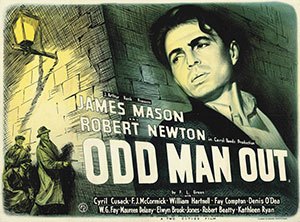March 03
Published in On this Day listing- 1959 During the Mau Mau uprising against British colonial rule in Kenya, eleven insurgent detainees were clubbed to death in the Hola detention camp. A further 77 sustained serious injuries.
- 1977 Brian Faulkner (56), last prime minister of Northern Ireland (March 1971–March 1972), was killed in a hunting accident, two days after his reception into the House of Lords.
- 1947
 Carol Reed’s film noir Odd Man Out, set in post-war Belfast with James Mason in the title role, opened in the city’s Classic cinema, off Royal Avenue. A large number of RUC men, in uniform and in plain clothes, were on duty outside, partly because Inspector General (Chief Constable) Sir Richard Pym was in the audience and partly because of the sensitive story-line, the tale of a badly wounded IRA gunman on the run after a botched robbery. Not that the RUC was formally identified in the film, nor indeed the IRA. The latter was identified only as ‘the Organisation’.Local audiences had mixed feelings about it. Some were unhappy with the liberties taken with the city’s topography. The Albert Clock, for instance, had been relocated. Most, however, complained about the lack of authentic Belfast accents amongst the cast. Mason, renowned for his mellow tones, failed to master the local intonations, while there was considerably more of the Liffey than the Lagan in the accents of the Abbey Theatre players who filled most of the supporting roles. All, however, had nothing but praise for the fifteen boys from a Falls Road industrial school who embellished the street scenes with their squabbling, fighting, kicking football and baiting the police. Odd Man Out was, of course, critically acclaimed. It received a Bafta award as best British film (1948) and Reed went on to direct another classic, The Third Man, a few years later. Its success provided a stepping-stone to Hollywood for James Mason, and the boys from St Patrick’s Industrial School were rewarded with a trip to Denham Studios in Buckinghamshire, where most of the indoor scenes were shot.
Carol Reed’s film noir Odd Man Out, set in post-war Belfast with James Mason in the title role, opened in the city’s Classic cinema, off Royal Avenue. A large number of RUC men, in uniform and in plain clothes, were on duty outside, partly because Inspector General (Chief Constable) Sir Richard Pym was in the audience and partly because of the sensitive story-line, the tale of a badly wounded IRA gunman on the run after a botched robbery. Not that the RUC was formally identified in the film, nor indeed the IRA. The latter was identified only as ‘the Organisation’.Local audiences had mixed feelings about it. Some were unhappy with the liberties taken with the city’s topography. The Albert Clock, for instance, had been relocated. Most, however, complained about the lack of authentic Belfast accents amongst the cast. Mason, renowned for his mellow tones, failed to master the local intonations, while there was considerably more of the Liffey than the Lagan in the accents of the Abbey Theatre players who filled most of the supporting roles. All, however, had nothing but praise for the fifteen boys from a Falls Road industrial school who embellished the street scenes with their squabbling, fighting, kicking football and baiting the police. Odd Man Out was, of course, critically acclaimed. It received a Bafta award as best British film (1948) and Reed went on to direct another classic, The Third Man, a few years later. Its success provided a stepping-stone to Hollywood for James Mason, and the boys from St Patrick’s Industrial School were rewarded with a trip to Denham Studios in Buckinghamshire, where most of the indoor scenes were shot. - 1918 The Treaty of Brest-Litovsk was signed between the new Bolshevik government of Soviet Russia and the Central Powers.
- 1978 Emmet Dalton (80), soldier and film producer, died. Dalton served with the British Army during the First World War and upon demobilisation in April 1919 joined the IRA and IRB. Described as bearing all the hallmarks of a British officer, including a cultured accent and a toothbrush moustache, he became close friends with Michael Collins and was appointed assistant director of training of the IRA during the War of Independence. After the Anglo-Irish Treaty (1922) he became director of military operations in the National Army and personally supervised the bombardment of the Four Courts, which ushered in the Civil War. Just over a month later he was famously at Collins’s side when the latter lost his life during the ambush at Béal na Bláth. Following a period of ill health, he resigned his commission later that year and afterwards made his living as a salesman. Then in 1958, along with the theatre impresario and film exhibitor Louis Ellman, he established Ardmore Studios on a 37-acre site in Bray, Co. Wicklow, initially concentrating on adopting Abbey Theatre plays as films—such as Walter Macken’s The Other Eden (1959). A number of films by foreign producers were also made there, notably Shake Hands with the Devil (1959), a drama set in the War of Independence and starring James Cagney. Later film-makers used the studio—and Ireland—as just another location for films such as The Spy Who Came in from the Cold (1965) and Excalibur (1981), made whilst the director, John Boorman, was chairman of Ardmore. Dalton died on his birthday and was accorded a military funeral to Glasnevin cemetery, where he was buried, at his own request, near his old friend Michael Collins.
'
















